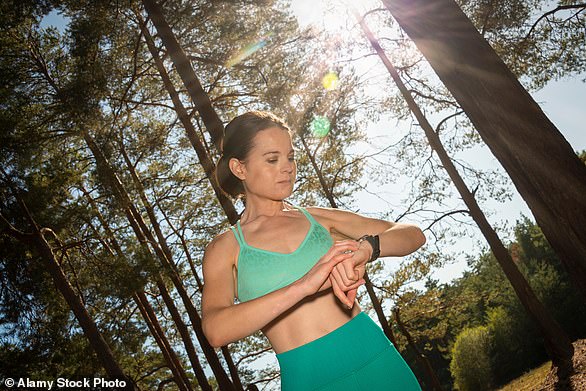My identical twin brother Chris is at the start of the Hackney half-marathon. I have written a bit of a race plan for him — ‘I need you to come out of the blocks very hard, OK? Have you got your heart rate zones worked out?’ I ask him.
He’s done no training whatsoever.
‘You really think I go as fast as I possibly can, and then what?’ he asks me, testily.
I explain: ‘Your job is to intimidate the other runners into quitting, to get to the front of the pack and intimidate them.’
Chris is having none of this: ‘I’m doing this because you’re like: ‘We’re doing exercise and, oh, Chris you need to get fit.’ You’re making all this worse.’
This is kind of funny, because Chris used to nag me constantly about me being unhealthy — we even made a radio series about it.
And it’s true. For years I was unhealthy, living with obesity, eating a diet with far too many takeaways, pizzas and other high-calorie, high-salt, high-carb, ultra-processed foods. I’ve long been the less healthy, ‘fatter’, more sluggish one in my family.
However, recently it’s become my turn to be the annoying, nagging twin — thanks to exercise, or, rather, Chris’s lack of it, and my becoming an exercise fanatic. Without a hint of irony, Chris says I’ve joined a cult.
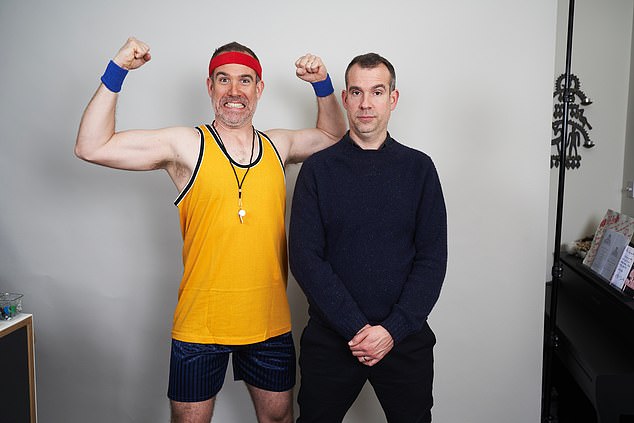
Public health expert Xand van Tulleken with twin brother Chris
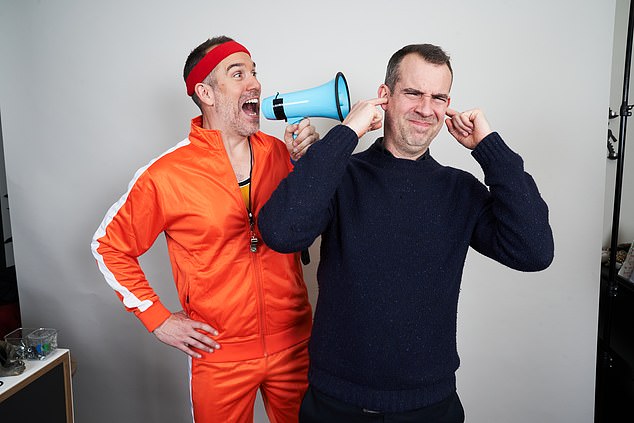
Chris used to nag me constantly about me being unhealthy — we even made a radio series about it
In Britain, we are suffering a national crisis of inactivity. The Government recommends we do 150 minutes of moderate exercise a week, but a quarter of UK adults are not physically active at all.
Exercise is not about losing weight (it’s almost impossible to lose much weight by working out): but inactivity is in itself directly linked with significantly higher risks of serious conditions such as heart disease, type 2 diabetes, stroke and cancer.
The fact is, the UK’s exercise crisis is up there with tobacco, excess alcohol and poor diet as a cause of disability and early death.
As a public health doctor, I find this very worrying, of course. But now it’s personal — Chris stopped exercising about a decade ago.
In his 30s he was extremely fit, going for regular runs, swims and bike rides. However, as we hit our 40s, Chris did, well, not much really.
His activity levels fell to just a gentle bike ride to work. The change was gradual, but one day it became apparent he couldn’t keep up with his kids or go for a jog.
I worry about him — we’ve always tried to look after each other — that’s why I decided to try to get Chris to change his sedentary ways.
If I’m honest, maybe I was a bit motivated by getting my own back; Chris had nagged me for years about my health and weight. Now the tables had turned!
Chris has found this role-swap highly irritating, as you will hear in our new series for BBC Radio 4 (A Thorough Examination with Drs Chris and Xand), where I try to inspire him to take up exercise, along the way speaking to scientists who’ve made some incredible discoveries about it.
Not least that regular exercise is preventive medicine par excellence; not only does it make us fitter and feel better about ourselves, it can also reduce our risk of suffering the sort of inflammation that can cause illnesses such as dementia, heart disease and cancer.

Exercise reduces our risk of suffering the sort of inflammation that can cause illnesses such as dementia, heart disease and cancer.
And the beauty of it is that you see the benefits quickly — with the biggest gains for people who start from having done nothing.
After just one session, whatever form it takes, you can measure improvements in muscle strength, immune-system efficiency and insulin sensitivity (a key indicator of your risk of type 2 diabetes).
There’s much more. In the process of trying to persuade my twin to start exercising healthily, we have both learnt about new medical discoveries that explain why, as we age, we need to do more exercise rather than less — and how this can actually banish the inflammation that also causes those diseases of age such as type 2 diabetes, stroke and dementia.
Despite such discoveries, in modern life it has become normal to be physically inactive.
Often we feel too busy or exercise seems too hard, too inconvenient or too expensive — and we don’t know how to get started.
That definitely describes how I felt. Four years ago, I was in poor health and my diet included far too many takeaways.
Now, I am a healthy weight, I’m active, I’ve cut out ultra-processed food almost entirely, I’m eating more fresh food and am in love with exercise.
What inspired the change? Certainly there was the alarm of suffering a heart problem in the wake of a Covid infection.
In March 2020, just days after considering myself recovered from a bout of Covid, I woke in the small hours with my heart beating chaotically and too fast. I felt bad: faint, sweaty, breathless.
My medical training told me that I had atrial fibrillation (where abnormal electrical impulses cause an irregular and often racing heartbeat).
I got a taxi to A&E where cardiologists shocked my heart into a normal rhythm. However, my heart wouldn’t keep this steady rhythm because part of the muscle had been damaged.
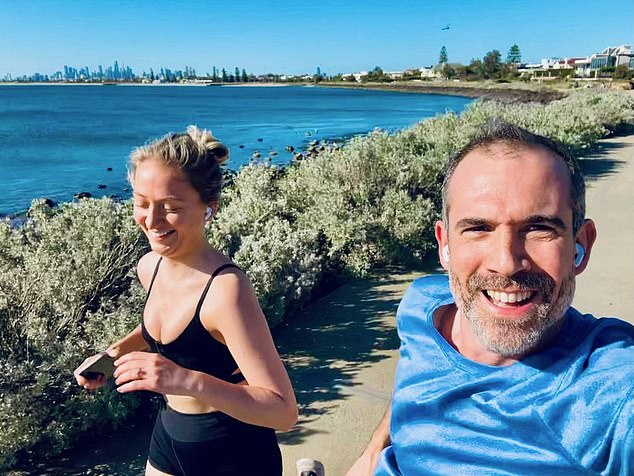
Developing a relationship with Dolly made me think about the decades ahead, and how I really wanted to live healthily and actively throughout them
Three months later, I had to have an op called an ablation to freeze away the damaged tissue. Thankfully, that fixed the problem and my heart is back to normal.
It was a wake-up call about the value of health, the consequences of ill-health and the need to exercise for my heart’s sake. The problem had been caused by Covid, but I was more vulnerable because of my weight and poor health.
But, to be honest, what ultimately made the difference was a different heart matter entirely — meeting Dolly in 2021. We married last year and are expecting our first child.
Developing a relationship with Dolly made me think about the decades ahead, and how I really wanted to live healthily and actively throughout them.
So one day, two years ago, when she said she was going for a run, I dragged my trainers from the cupboard and joined her.
That first run felt so horrible, I thought I was going to die. OK, I didn’t actually think I’d drop down dead, but it was terrifying to realise just how out of shape I was.
I burst into tears when we got home, which was a bit hard to explain to Dolly who had not found the jog particularly challenging.
I realised that, for a long time, I had given up on myself. I’d just decided I was not going to look after myself at all and I would just be dead at 65; I was falling apart and that was OK. But after that run, I felt I literally had something to live for. And so I persisted with the exercise.
Having an exercise buddy was itself a great help, and steadily I began to run more until, frankly, it became a bit of an obsession.
Meanwhile, Chris had been going the other way.
A decade ago, when Chris was fit, he was under 80kg. But life had overwhelmed him as it does for many people: work piled up and his kids (he and his wife Dinah are expecting their third) came along.
‘As a parent with young children I’ve been quite housebound and I stopped exercising,’ he admits. ‘I’ve also lost the joy of exercise. It doesn’t feel like it suits me and I can’t be bothered.’
While he agrees that he’s tipped into overweight and middle-aged spread — ‘I’m more than 88kg and I feel older than I should. I can’t jog one mile without suffering discomfort,’ he says — what worries me is I can see he’s heading into the world of the frail and tired.
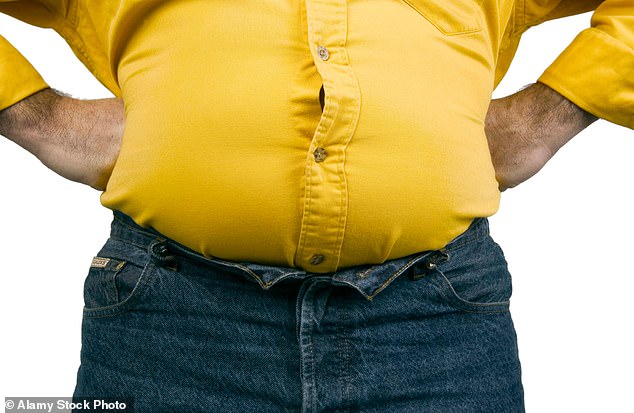
Exercise is not about losing weight (it’s almost impossible to lose much weight by working out): but inactivity is in itself directly linked with significantly higher risks of serious conditions such as heart disease, type 2 diabetes, stroke and cancer
Chris had felt concerned enough last year to sign up to run a half-marathon with some of the other dads in his neighbourhood.
But that spark of enthusiasm quickly disappeared. He felt so negative towards exercise that he didn’t do any training whatsoever.
Instead, as you hear in the podcast, he walks almost all the half-marathon and, embarrassed to find himself walking at the same speed as the pedestrians going to the shops, adds in a few guilty attempts at jogging on the way.
In fact, at one point he asked our producer, Tom, who was jogging alongside him carrying his record equipment and wearing jeans and a jumper, to please leave him alone as it was getting embarrassing.
Chris does finish, but afterwards he complains bitterly of sore feet, an aching back — and a general sense of feeling sad and bad about the whole thing. ‘I feel like I’ve fallen a long way,’ he says.
It’s exactly the opposite of all the good mind-and-body benefits that exercise is meant to bring.
Of course, I feel a bit smug about all this. After all, I’ve got fit, vastly improved my diet and become a serious running fan.
Chris had his doubts about this transformation though. And he had a point: I was using an app on my smartphone that measures my running performance and I had become seriously competitive with myself.
I had to keep beating my personal bests for doing things such as running around the park and became a bit obsessive.
One of the many scientists Chris and I go to see for the podcast is Professor Sir Muir Gray, 79, a doctor who has held senior positions in UK public health and screening programmes and who remains startlingly fit, even as he approaches his 80s.
Muir is convinced that — so long as we’re lucky enough to avoid health disasters, such as unexplained cancers — with regular exercise we can all stay sprightly well into our ninth decade.
‘Barring disasters, you can stave off the worst effects of ageing until you are in your 90s,’ he tells us.
‘Her Majesty Queen Elizabeth was a great example of this, keeping going until she died in the space of two days at the age of 96. An excellent end to life.’
However, Muir warns: ‘The current state of the nation’s health is absolutely shocking. It had been improving through most of the 20th century, but now life expectancy is falling and the number of years that people live with disability is increasing.’
As a result, millions of ageing people are suffering unnecessarily miserable lives.
Muir and other experts argue that inactivity is, in large part, causing this crisis. ‘It is essential that we increase the activity of almost everyone,’ he adds.
To prove he practises what he preaches, Muir promptly gets down on the floor and demonstrates 66 rapid press-ups while wearing a suit and tie.
We don’t all have to be super-fit Muirs, he says reassuringly: ‘People are very confused about the hows and whats of exercise.
‘But if you can do medium exercise, where you’re not too breathless to talk, it will help with lung disease, heart disease, stroke and dementia. That is very well established.’
And we shouldn’t worry if we’ve spent years slacking, he adds.
‘At any age, with exercise you can become as able as you were ten years previously. Yes, you can drop a decade!’
The only caveat, he says, is that: ‘Everyone needs to become more active as they age, not less. Because you are losing your youthful resilience, you need to do a bit more every day.’
Muir himself incorporates moderate exercise into his daily life: ‘I try to walk briskly for 30 minutes every day, and do all my phone calls at the same time.
For 10-12 minutes every morning I do core-strength exercises such as the plank. At the end of the day I spend two minutes standing on one leg to improve my coordination.’
But exactly why does exercise have its magical health effect, rather than making us all feel worn out and a bit miserable (as Chris tends to fear)?
That’s where astonishing research pioneered by Professor Herman Pontzer comes in.
An evolutionary biologist at the Duke Global Health Institute in the U.S., his studies have turned accepted exercise wisdom on its head.
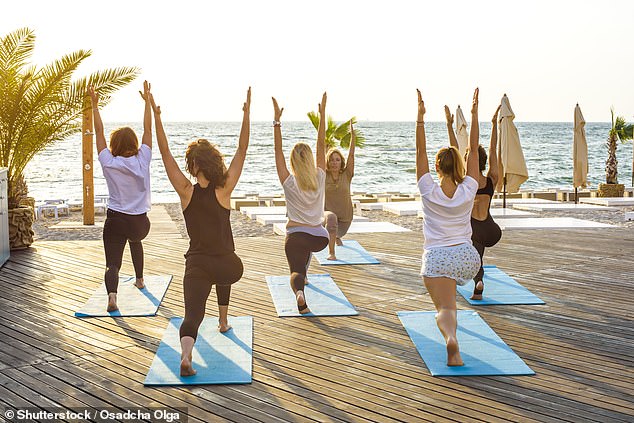
In people who don’t exercise (i.e. millions of Britons), their bodies use those calories to put more energy than necessary into powering basic biological systems — the immune systems, the reproductive systems, the stress responses
He’s been in Tanzania studying the Hadza people, whose hunter-gatherer lifestyle most resembles the conditions in which our modern human bodies evolved.
In the space of just one day Hazda people walk around 15 miles, so get more exercise than the typical Briton does in a week.
So you’d think they’d burn a load more calories. But they don’t.
Professor Pontzer told us it seems that whether you exercise or not, your body consistently burns the same amount of calories. But in different circumstances it spends those calories on different budgets.
In people who don’t exercise (i.e. millions of Britons), their bodies use those calories to put more energy than necessary into powering basic biological systems — the immune systems, the reproductive systems, the stress responses.
That might sound potentially helpful. But it’s not, because it seems that driving those systems too hard may lie at the heart of some of our worst modern lifestyle epidemics, such as dementia, cancer, depression and anxiety.
An overactive immune system, for example, may cause chronic inflammation that can damage brains, causing dementia, as well as harming vital organs such as our hearts — and damaging cells so badly that they turn cancerous.
As for having too many reproductive hormones, we already know that higher than necessary levels of testosterone and oestrogen are linked to increased risk of cancers such as prostate cancer in men and breast and ovarian cancers in women.
Moreover, if we constantly have excessive levels of the stress hormones cortisol and adrenaline in our bloodstreams, we’re prone to becoming chronically anxious and subsequently depressed.
By contrast, it has also been widely shown that people who exercise regularly can significantly lower their levels of inflammation.
Put simply, exercise steals energy from harmful inflammation, anxiety and cancer-driving hormones.
Our bodies have evolved to run healthily on a certain level of exercise. If we don’t get it, the unspent energy is left to cause us trouble.
The problem, of course, is that often we can only exercise in our precious spare time.
And while Chris was impressed by the experts’ arguments, he still wasn’t convinced enough to get moving.
Chris hates the idea of gyms — at least he says he does. It may be he’s just a bit intimidated by them. And fair enough, they’re not for everyone.
So I try to persuade him instead to start exercising by getting him to come running with me — or at least to cycle alongside me while I tried to set a new personal best for running a lap of my local park.
This plan went badly — as you can hear on the podcast. Essentially, I’d hoped to impress and inspire Chris with my speed and for him to see how joyful running was for me.
Instead, it ends with me as an angry man in a park shouting at my brother. What’s more, rather than being an encouraging exercise buddy for Chris, I’m beginning to annoy him.
In a final attempt to find a fun and sustainable form of exercise, I drag Chris into the park once more, to play ping-pong.
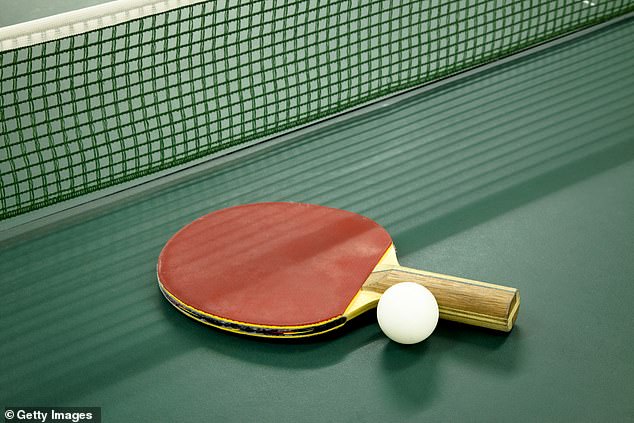
In a final attempt to find a fun and sustainable form of exercise, I drag Chris into the park once more, to play ping-pong
Rather than have us compete — very boring, as you never beat your identical twin by much — I thought we could cooperate by seeing how long we could keep up a rally.
But Chris gets bored anyway and his attention wanders. And that’s when the miracle happens. He starts to watch a bunch of guys on the other side of the park doing lunges and squat-thrusts.
‘That looks like actual fun,’ he says. ‘Let’s go talk with them.’
And that’s how Chris got to learn about calisthenics: using your own body weight to get fit with exercises such as press-ups, chin-ups and sit-ups.
Done vigorously, calisthenics can be a form of high-intensity interval training (HIIT) that can do as much good for your fitness levels in ten minutes as 30 minutes of lower-intensity exercise.
That was four months ago, and Chris is still keeping up the calisthenics.
‘It’s achievable stuff that I can fit into my life and which I can quite enjoy,’ says Chris. ‘My fitness has definitely improved. I can now carry the kids around without feeling that I’m about to hurt my back.’
In fact, Chris can now do more chin-ups than me, and is aiming to break the ten-chin-up barrier, as well as doing push-ups daily. He’s doing what’s necessary to cover the minimum exercise required to keep his fitness up — and his self-respect along with it. He’s even thinking about possibly doing another half-marathon. Properly.
A Thorough Examination With Drs Chris And Xand: Exercise, every Tuesday on BBC Radio 4 at 3.30pm from today (or catch up on BBC Sounds).

